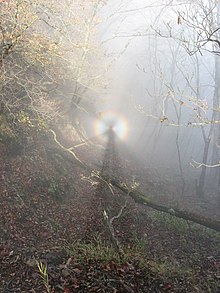Wonder
Wonder is an emotion comparable to surprise that people feel when perceiving something rare, unexpected, or puzzling to their conceptions.

Quotes edit
- A life of love is one of continual growth, where the doors and windows of experience are always open to the wonder and magic that life offers. To love is to risk living fully.
- May the people marvel admiringly, and may Utu witness it in joy.
- Enmerkar to Inana, in Enmerkar and the Lord of Aratta, Neo-Sumerian period (ca. 21st century BCE). [1]
- Genius goes around the world in its youth incessantly apologizing for having large feet. What wonder that later in life it should be inclined to raise those feet too swiftly to fools and bores.
- F. Scott Fitzgerald, in The Crack-Up (1936), Notebook E (1945), as edited by Edmund Wilson
- That kind of deep attention that we pay as children is something that I cherish, that I think we all can cherish and reclaim, because attention is that doorway to gratitude, the doorway to wonder, the doorway to reciprocity. And it worries me greatly that today’s children can recognize 100 corporate logos and fewer than 10 plants.
- Robin Wall Kimmerer Interview on On Being podcast (2022)
- The core and the surface
Are essentially the same
Words making them seem different
Only to express appearance.
If name be needed, wonder names them both:
From wonder into wonder existence opens.- Laozi in the Tao Te Ching, as translated in The Way of Life, According to Laotzu (1944) by Witter Bynner
- The Piglet was sitting on the ground at the door of his house blowing happily at a dandelion, and wondering whether it would be this year, next year, sometime or never, and was trying to remember what it was, and hoping it wasn't anything nice...
- A. A. Milne, in Winnie-the-Pooh (1926).
- Wonder is not a disease. Wonder, and its expression in poetry and the arts, are among the most important things which seem to distinguish men from other animals, and intelligent and sensitive people from morons.
- Alan Watts, in "The Book on the Taboo Against Knowing Who You Are" (1966).
- When we affirm that philosophy begins with wonder, we are affirming in effect that sentiment is prior to reason.
- Richard Weaver, in Ideas have Consequences (1948), p. 19.
- Philosophy is the product of wonder. The effort after the general characterization of the world around us is the romance of human thought.
- Alfred North Whitehead, in Nature and Life (1934) Ch. 1.
- Philosophy begins in wonder. And, at the end, when philosophic thought has done its best, the wonder remains.
- Alfred North Whitehead, in Modes of Thought (1938) Ch. 3, Lecture 7, p. 232.
- Man has to awaken to wonder — and so perhaps do peoples. Science is a way of sending him to sleep again.
- Ludwig Wittgenstein, notes from 1930, in Culture and Value (1984), translated by Peter Winch, p. 5.
External links edit
Emotions
Adoration ~ Affection ~ Agony ~ Amusement ~ Anger ~ Anguish ~ Anxiety ~ Apathy ~ Awe ~ Boredom ~ Calmness ~ Cheerfulness ~ Compassion ~ Contempt ~ Contentment ~ Depression ~ Desire ~ Disappointment ~ Discontent ~ Disgust ~ Ecstasy ~ Embarrassment ~ Empathy ~ Enthusiasm ~ Envy ~ Euphoria ~ Fear ~ Gratitude ~ Grief ~ Guilt ~ Happiness ~ Hatred ~ Hope ~ Hostility ~ Humiliation ~ Impatience ~ Indignation ~ Insecurity ~ Jealousy ~ Joy ~ Loneliness ~ Loss ~ Love ~ Lust ~ Malice ~ Melancholy ~ Nostalgia ~ Panic ~ Passion ~ Pity ~ Pride ~ Rage ~ Regret ~ Remorse ~ Resentment ~ Sadness ~ Shame ~ Sorrow ~ Suffering ~ Surprise ~ Sympathy ~ Wonder ~ Worry